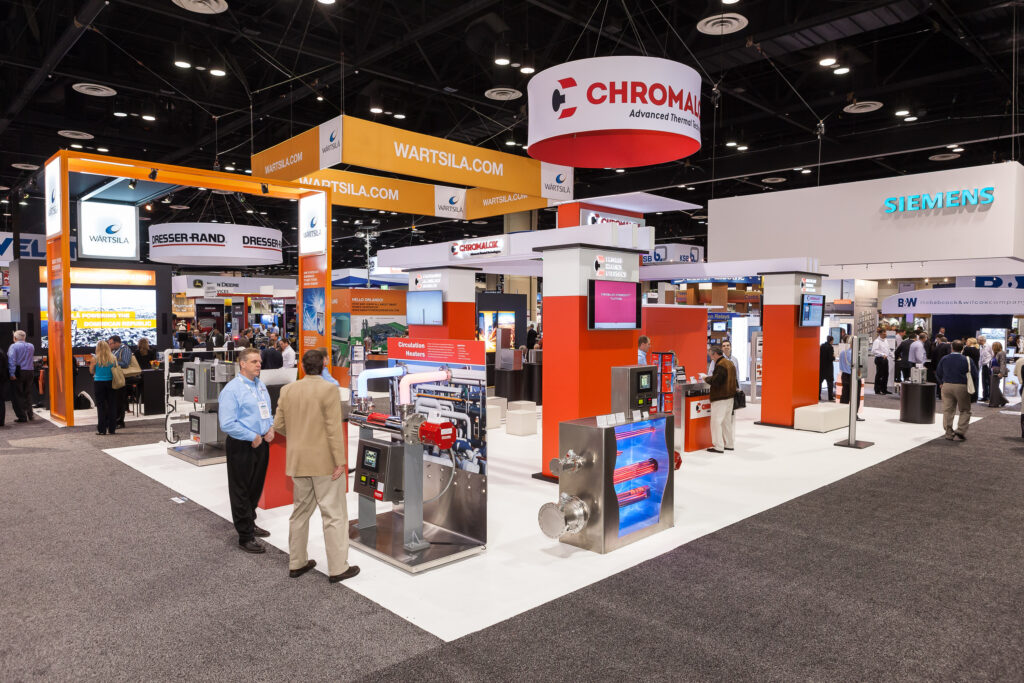The success of your trade show booth is directly connected to the performance of your team. However, research shows that only 26% of businesses conduct employee training for trade shows. And more than 50% of companies never offer trade show staff training for their employees. This is a major oversight since 80% of visitors base their impression of your brand on the brief encounter they have with your team. If you’re interested in training your staff for your next trade show, this blog has the information you need.
Download the Effective Trade Show Staff Training Guide
Establish Your Trade Show Goals Beforehand
Everyone has to be on the same page when it comes to your trade show goals. When you’re training employees for a trade show, they need to clearly understand their unique roles. Make sure they have the training they need to start conversations with visitors, rather than leaving it to chance. Having clearly-defined goals helps everything else fall into place once the show starts.
Whether they’re seasoned veterans or new additions, your staff should know why you’re attending the show. Here are a few common objectives:
- Upselling or cross-selling to existing customers
- Generating and qualifying new leads
- Introducing and promoting a new product or service
If your goal is to upsell or cross-sell, make sure your staff can identify your existing customers. An attendee may be looking for a member of your sales team who they’ve worked with before. If that team member isn’t available, your other staff should be able to talk to that individual and relay any relevant information.
Provide Employee Trade Show Incentives to Keep Staff Motivated
Trade shows require your staff to work long, tiring days. It can be difficult to keep them motivated, but their engagement with visitors is key to your success. One way to keep your team motivated is by creating daily goals. Your staff can compete against each other to achieve those goals. Make sure there’s a reward for the winner!
Daily pre-show meetings can also build team spirit and healthy competition. It’s important to recognize what your employees are doing well and reinforce their achievements.
Your team can’t compete if they aren’t properly trained, though. Ensure they’re prepared by giving them specific, detailed feedback throughout the trade show. Don’t ignore their ideas, and, if possible, give them input into how the booth is run.

Let Staff Know They Play an Important Role
Your employees are your biggest brand ambassadors, and this is especially true at trade shows. Your booth should speak for itself, but your staff is still your most valuable asset. Set them up for success with comprehensive booth staff trade show training and preparation.
Wondering who to staff your booth with? Best practices call for team members with industry and product experience. Choose people with strong presentation and speaking skills, which are traits your sales team should already possess.
Don’t neglect continuous training and education for your sales team. It’s crucial that they’re on their toes, because every visitor is a potential lead who could be your next big sale.
You may be hesitant to send more inexperienced team members to a trade show. However, in some cases, these individuals may be more motivated and excited than their seasoned counterparts. The best employees are always ready to learn, and this could be the case with your newer employees.
Finally, consider bringing engineers, IT specialists, and any other relevant team members. It doesn’t just have to be salespeople. In some cases, other staff members may have more product knowledge than your sales team. Their knowledge and attitude is the perfect complement to your sales team.
Emphasize the Importance of Trade Show Booth Staff Etiquette
Learning about booth etiquette is another crucial aspect of effective trade show training. In many cases, your booth is the first impression visitors have of your business. One of the most important rules is to engage visitors within 15-20 seconds. Attendees want to be acknowledged and valued. And for all you know, they could be your next big account!
Train Employees on Body Language
In many cases, nonverbal communication is more telling than verbal communication. Make sure your staff knows how to read positive or negative body language in attendees. They should also know how to project positive body language during their interactions with visitors (and each other). Your team should:
- Greet attendees as they enter your booth from a standing position.
- Smile and make eye contact with attendees, even if they aren’t talking to them.
- Thank visitors as they exit your booth, even if they weren’t a lead.
It’s also important to remember that some visitors are just browsing and aren’t looking for an interaction with your team. Again, they must be able to read body language and decipher whether someone wants to talk to them.

Make Sure Your Team is Well-Groomed
It’s also key that your staff looks well-groomed and projects have a professional appearance. After all, you wouldn’t want to visit a messy booth with employees who look like they just rolled out of bed. At no point should anyone be eating, drinking, chewing gum, talking on the phone, texting, or reading. Ultimately, your staff’s appearance and attire go hand-in-hand with their excitement about your product or service.
Don’t Neglect Your Booth’s Appearance
Your booth should also be attractive and tidy throughout the duration of the trade show. Store empty boxes and unused supplies in places where visitors can’t see them. This might be behind an exhibit wall or under a skirted table. Make sure there’s also no trash or employee possessions within view. You want visitors to focus on your product or service, not an empty box in the corner.
Have a Follow-Up Plan in Place
Another often overlooked aspect of booth staff trade show training is having a follow-up plan to handle leads. It’s key to designate which team member should follow up with which prospects. That way you don’t have multiple people reaching out to the same lead. You might divide prospects up by geographic region, industry, or position in the sales funnel, but the decision is ultimately up to you.
Other Trade Show Staff Training Tips
We’ve covered the main considerations of training your trade show staff. However, there are a few other tips to keep in mind:
- Pay attention to scheduling. You should bring enough team members so that everyone can take a break if they need to. Spending an entire day in a booth can be exhausting, and you want your team members to be at their best. If they don’t have time for lunch or restroom breaks, they may not be as focused as they could be, leading to you not making a sale or capturing a potential lead. This can also push staff to not want to come to another show in the future.
- Practice demonstrations beforehand. If product or service demos are part of your trade show booth, have your team members practice them beforehand. This works out any issues and ensures your team is on-message and on-brand.
- Ensure team members are asking open-ended questions. Rather than opening with “how are you?” (or something similar), your staff should try to relate to prospects. For example, they might ask, “what attracted you to the trade show?” or “what does your company do?” This shows visitors that your staff is interested, but doesn’t make them seem pushy.
- Have a system to save staff from opportunists. In some cases, visitors are only stopping by because they want freebies or giveaways. They may have no real interest in your company. Work through these scenarios with your team members in advance and implement a system where they can help each other out.
- Teach your team how to listen. In many cases, salespeople don’t know how to listen. This can be detrimental and lead prospects to feel like they’re not being heard. There are a variety of listening exercises available that can help your team communicate more effectively.
Download the Effective Trade Show Staff Training Guide
Preparing for your next trade show? Want your staff to brush up on their existing skills? We offer comprehensive, full-service trade show staff training to keep you at the top of your game. Contact us today to get started.
